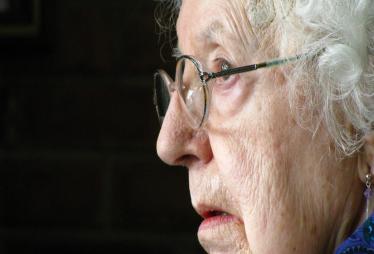Much of our emphasis on care at Care Not Killing is on the care that terminally or otherwise seriously ill people need. We believe that such care, rather than legalising assistance with suicide or the giving of lethal injections, is the proper and civilised way to deal with chronic or end-of-life illness.
But there is another dimension to care - what is sometimes referred to as 'Care in the Community'. Here we are talking about the everyday home care that is given to hundreds of thousands of people who are incapacitated in one way or another and who are dependent on visits by care workers commissioned by their local authorities. A recent BBC Panorama programme has highlighted some shocking instances of poor-quality care. Its findings have been summarised Rosemary Bennett, The Times' Social Affairs Correspondent. She writes:
"Ministers want many more people to stay in their homes with support, rather than going into more expensive residential homes. That policy has been welcomed by campaign groups but they are now questioning whether enough effort is going into regulating home care and if local authorities are trying to provide it on the cheap."
Much of home care is now provided via private organisations. According to The Times, more than one and a half billion pounds worth in contracts with local authorities is involved here. So why are cases of serious neglect and poor standards coming to light?
Part of the problem is that for the last 20 years we have tended increasingly to see the provision of public services of all kinds in purely commercial-style contractual terms. Many people will have noticed, for example, the way in which passengers on trains are now referred to as 'customers'. The system has its good points. It forces those who are commissioning services to think carefully about what is needed and to define requirements in such a way as to enable performance to be measured and audited and waste avoided.
But the system has its downside too. Because it is easier to measure quantity than quality, the effectiveness of care services can all too often be measured in terms of numbers of homes visited and numbers of hours spent there rather than in terms of whether the care that has been provided meets the needs of the recipients. This is a problem that is sometimes referred to as 'service-led rather than needs-led care' - ie this is what the care provider has contracted with the local authority to give, so this is what the recipient gets. And, because there are contracts involved, there can be a temptation to cut corners. As one correspondent, a retired Nurse Consultant, wrote to The Times in the wake of the Panorama programme, "the service is clearly designed to operate around the needs of companies, and patients just get in the way".
More generally, while some public services may lend themselves to being managed on commercial lines, it is questionable whether the provision of social care to the more vulnerable members of society is a suitable candidate for such treatment. Do we really want care workers measuring the time they spend with incapacitated people with a stopwatch, as seems to be happening now in some cases, against rigidly defined schedules for such things as washing, dressing and feeding? Can such practices really be regarded as appropriate to a civilised society?
It would, of course, be wrong to jump to the conclusion all care providers are tarred with the same brush as those cited by Panorama. One of contributors to the blog on Rosemary Bennett's excellent article commented that the organisation for which she works had just been inspected by the Care Quality Commission (CQC) and received an 'excellent' rating. But, without in any way wishing to question the rating given in this case, we feel we should ask: on what basis does the CQC conduct its inspections? Does it visit the recipients of care to ascertain whether appropriate care has been delivered? Or does it content itself with establishing simply whether the firms providing the care have what seem to be suitable management systems in place?
The CQC has been in existence for only two weeks. On 1 April this year it replaced the Commission for Social Care Inspection and the Health Care Commission, one of the objectives of this merger being to promote greater synergy between health and social care services. Cynthia Bower, the CQC's Chief Executive, is quoted in The Times as saying that "we will not hesitate to use our statutory powers" to clamp down on companies providing sub-standard care services. Let us hope it will do so and that the creation of this new body proves to be more than simply a rearrangement of the regulatory furniture.
Panorama exposes a shaming tale of misery and neglect
Short cuts don't lead to decent care






